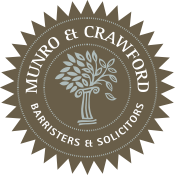Life can be unpredictable, so it’s vital to protect the people you care for. Estate planning is the process of arranging what will happen to your assets after you die, or if you become incapacitated. A well-crafted estate plan will preserve your wealth and put your mind at ease.
Don’t wait – take control of your future by scheduling a consultation with Munro & Crawford.
Get Help from a Lawyer
Assess Your Estate Planning Needs
First, you need to identify what you want to include in your estate plan. An estate plan is a collection of legal documents, which include:
-
- Last will and testament: How your assets will be distributed.
- Living will: How your estate will be managed if you are incapacitated.
- Power of attorney: Who has the authority to manage your estate while you are alive.
- Executor: Who has the authority to manage your estate if you pass away.
- Beneficiaries: Who are your beneficiaries – spouse, children, grandchildren, charities, etc.
Your estate planning checklist should also feature a review of your assets, which includes real estate, bank accounts, investments, liabilities, and personal belongings.
Prepare Your Will
Next on the estate planning checklist is will preparation. A will specifies exactly how your assets will be distributed after your death, and ensures your inheritance wishes are clear and legally enforceable.
Why do you need a will? Failing to make a will can complicate the probate process and force family members to make difficult decisions.
A will typically includes:
- Your personal information
- The executor of the will
- Your assets
- Who will inherit these assets
- Any other special instructions
Establish Trusts if Necessary
Trusts are legal documents that allow you to transfer ownership of your assets to a “trustee”, who can manage them on behalf of your beneficiaries. They are not a necessary part of an estate planning checklist, but can be beneficial depending on your requirements.
Trusts protect beneficiaries if they are yet to reach a certain age, or have special needs or disabilities and require ongoing support. They offer greater flexibility and control over how your assets are distributed, and can be used to minimize inheritance taxes. Work with a professional legal team to ensure your trusts are set up correctly.
Designate Power of Attorney
A key part of an estate planning checklist is appointing an individual you trust to make decisions on your behalf if you are incapacitated. This differs from the executor, who will make decisions following your death – you can even use professional executor services.
A power of attorney covers responsibilities including:
- Financial: Managing accounts, investing money, and buying or selling property
- Healthcare: Making decisions about medicine and treatment
- Legal: Signing legal documents, filing taxes, and resolving disputes
- Inheritance: Preventing delays and streamlining how assets are distributed to beneficiaries
Consider Different Advanced Care Plan Options
A basic power of attorney does not extend to medical decisions in BC. To ensure you have health instructions and wishes covered, consider having an Advance Directive. These are extended, voluntary, instructions to ensure your medical wishes are available to health care providers in the event you are no longer capable of decision-making yourself. An advance directive does not directly grant anyone else the authority to act on your behalf – for that you would need a Representation Agreement.
Representation agreements can cover both health care and personal matters, and while some types can include finances, you would typically create an Enduring Power of Attorney (EPA) to handle that. EPAs grant another person the legal ability to make financial and legal decisions on your behalf, but do not extend to lifestyle, accommodation, or medical decisions.
For a more advanced breakdown of these options, and to see what is best for you, please talk to a lawyer.
Review and Update Your Estate Plan Regularly
Life circumstances change. The final part of your estate planning checklist is to regularly review and update your estate plan based on shifting circumstances to protect your beneficiaries and ensure trusts still reflect your wishes.
You should update your estate plan after:
- Getting married
- Having children
- Moving house
- Divorcing or separating
- Moving overseas
- Experiencing changes to personal health
- Losing beneficiaries or an executor
New laws can also affect your inheritance and will preparation. It’s vital that your estate plan protects your assets and intentions even as new state, federal and international laws come into effect.
Need Help With Your Estate Planning Checklist?
Estate planning can be overwhelming. Munro & Crawford can help. We specialize in wills and trusts, and probate and estate administration. Contact us via our website or call 604-266-7174 to talk to our experienced and empathetic legal team.








